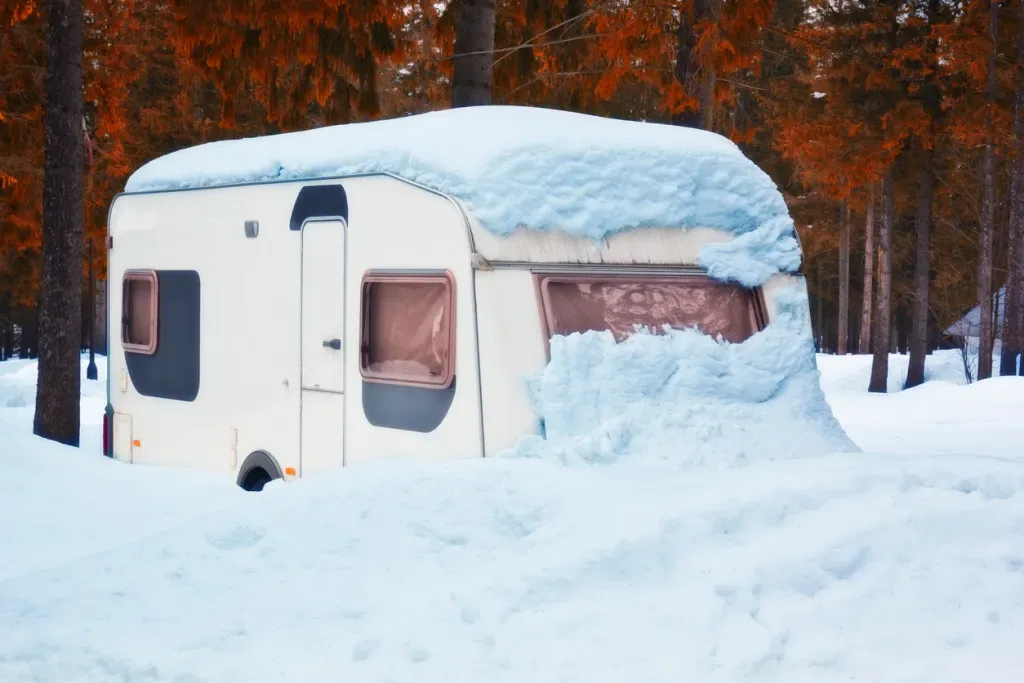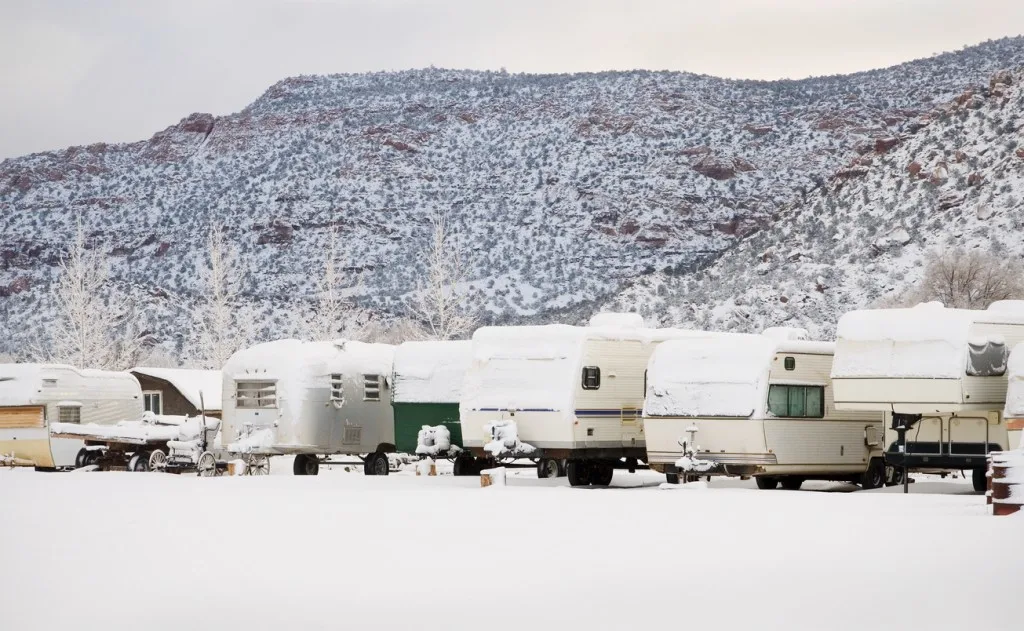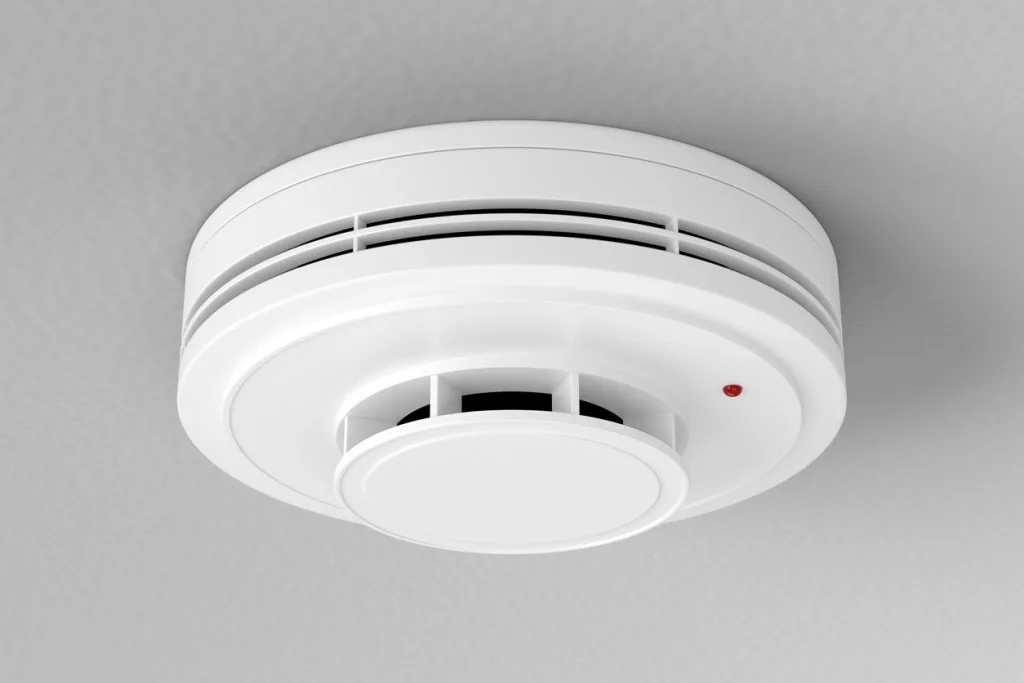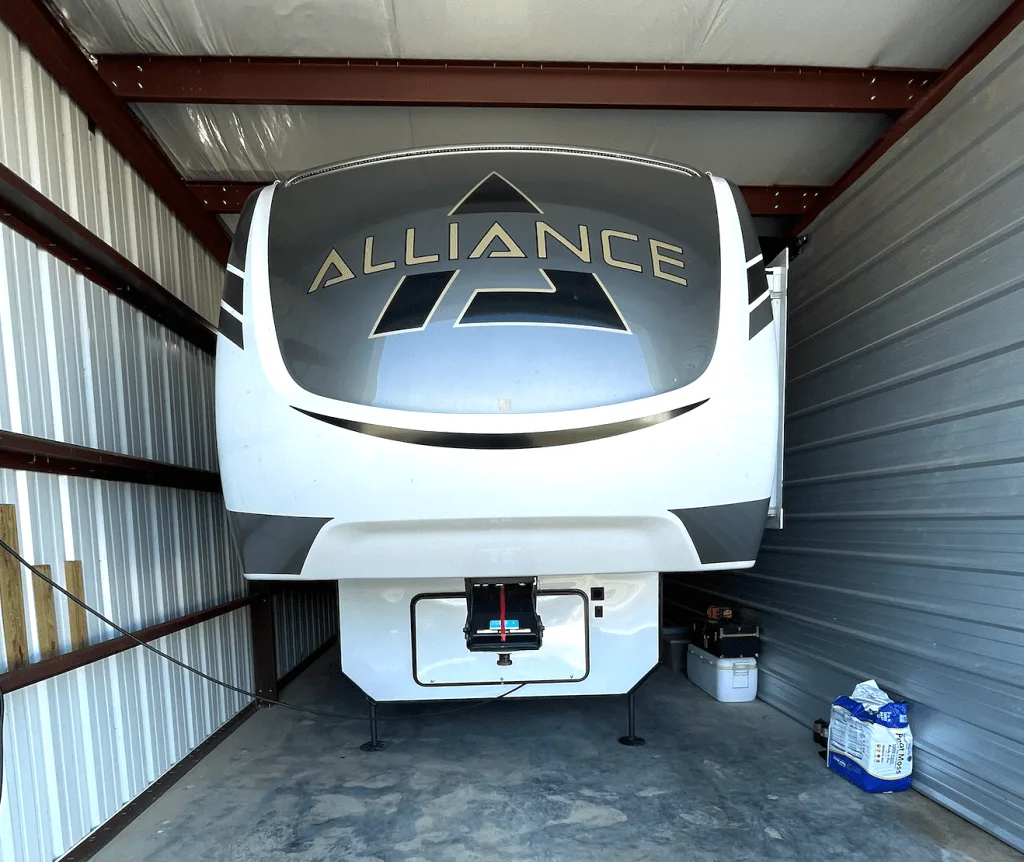Do you want to use your RV during freezing weather? If so, taking steps to maximize your comfort and protect your rig is essential.
With less-than-ideal conditions, you may have the entire campground to yourself. However, it could be a miserable trip if you don’t take the necessary precautions.
Today, we’re sharing some tips to help keep you and your RV warm when the temperatures plummet.
Let’s get toasty!

How Cold Is Too Cold for an RV?
Unfortunately, there’s no set rule for how cold is too cold for an RV. Water in your plumbing system can solidify whenever the outside temps dip below 32 degrees Fahrenheit. It’s one reason we recommend winterizing units at the end of each camping season.
Water expands as it turns into ice, which can cause severe damage to plumbing lines, water heaters, and storage tanks. Sadly, you likely won’t discover the damage until your next trip.
Fortunately, some manufacturers are more generous with insulation than others. A unit with a four-season rating indicates it can handle more extreme settings. It may include an enclosed underbelly and ducts to pump warm air into storage compartments. These features can protect RV plumbing and other critical components during freezing weather.

With the proper rig, you can withstand temperatures in the teens and potentially even single digits. However, staying comfortable in a motorhome or trailer can be challenging in these dangerous conditions.
How Long Does It Take for Water to Freeze in RV Pipes?
The time it takes water to freeze pipes depends on several things. For starters, the outside temperature is one of the most significant factors. The further it falls below 32 degrees Fahrenheit, the less time it’ll take. It could be anywhere from a couple to 24 hours of freezing weather before an RV experiences issues.
However, when the thermometer drops, you don’t need to immediately panic. Pipes can withstand a few hours of frigid digits and be fine. If you’re staying in it, you’ll likely be heating the rig somehow. Warm air traveling throughout the camper can keep appliances and plumbing safe.
Generally, the most notable problems result from extended time below 32 degrees. Take extra precautions if the high for the day falls below this number. We’ll share valuable tips below on what to do in this scenario.
What about your tanks? Will RV Holding Tanks Freeze?

Is It Cheaper to Run an Electric Heater or a Gas Furnace?
The cheapest option to stay warm in your RV often depends on the circumstances. For instance, using an electric heater can save you money and propane if you’re in a campground and not paying for your electrical usage. These products require tremendous power and are typically sufficient for a single room during extreme situations.
On the other hand, a gas furnace is much more efficient for keeping your entire camper warm by pushing hot air through vents. Ducts in under-storage compartments can help avoid damage to the plumbing system.
Overall, the best option is often to combine the two. Use the furnace as the primary source and an electric heater as a supplement. This method can help you keep costs down and also save your propane.
Dig In: Do RV Furnaces Run on Electricity?
Can Your RV Furnace Kill You?
While your furnace can keep you and your RV snug during freezing weather, it can also be dangerous. These units often run off propane, which generates carbon monoxide when burned. Blocked vents can cause the gas to infiltrate your living space and create a hazardous situation.
Because of the potential threat, having a carbon monoxide detector in your RV is a good idea. These devices are so important that it’s typically a requirement for manufacturers to install them during production. However, they’ll only do you good if they’re functioning properly. Test them at least twice yearly so you know they’re working correctly.

Additionally, the propane used in your heating system can be dangerous even without burning it. Should you develop a leak, the gas can gather and displace the amount of oxygen available inside your camper. Your body can start to experience serious health issues as less oxygen is available. A tiny spark in this situation could cause an explosion.
Tips to Keep Your RV Warm in Freezing Weather
If you want to stay warm in your RV in the midst of freezing weather, it’s going to take some work. By taking some relatively easy actions, you’ll improve your comfort during your winter adventures.
Invest in RV Skirting
Skirting acts as a wind block to prevent cold air from getting underneath the rig. Prices for these products range from a couple of hundred dollars for DIY versions to thousands for custom models. When used correctly, they can be very effective.
However, they’re typically only best if you’re stationary or don’t plan to move frequently. Additionally, many parks and campgrounds prohibit guests from using them. Check the rules and regulations where you plan to camp before making the investment.
Install Window Insulation
The next tip for you to consider is insulating your windows. Massive panels may be great for letting in natural light, but they can also let in cold air. They can work against you and the heating sources in your RV during freezing weather.
One of the easiest ways to install insulation is to purchase a roll of Reflectix. The flexible product easily cuts to size, so it fits perfectly in the windows of your motorhome. It’s also great to use during the summer to keep UV rays and heat from the sun out.
Pro Tip: These RV Vent Insulators are excellent for keeping heat in during the winter and heat out during the summer.
Don’t Let Heat Escape
Staying cozy in your RV during freezing weather requires heat to remain indoors. Keeping your door closed as much as possible traps air and avoids inviting the cold inside. The interior temperature will drop quickly if you continually open and close your access points.
Identify any areas where heat can escape. Since hot air rises, the upper part of your RV is typically one of the first places to check.
Like windows, vents in the ceiling can work against you. Using vent pillows that fit in these spaces can help insulate the inside of your camper and keep heat inside.
Buy the Right RV
As mentioned, some RVs are better than others for keeping you comfortable amid freezing weather. If you’re shopping for a new camper, consider how it’ll perform during cold conditions.
An enclosed underbelly, tank heaters, and ducts in storage compartments are features you want to see. In our experience, manufacturers are often too generous in giving their products a four-season rating. Reading owner reviews can help you have confidence your investment will meet your expectations.

Dress Appropriately
Don’t complain about being cold in your RV if you’re in shorts and a t-shirt when battling freezing weather. Make sure you pack thick socks, sweatshirts, and pants to wear during your winter adventures.
When camping in frigid situations, it’s a good idea to wear warm clothing inside your rig. If you don’t, you’re not doing yourself or your furnace any favors. Putting on another layer is cheaper than using more propane or electricity.
Should You RV During Freezing Weather?
Using your RV during freezing weather can be challenging but not impossible. Even if you don’t plan to camp during these conditions, Mother Nature can unexpectedly change her plan. When she does, it’s vital to know how to respond. Being aware of what to do can help you and your motorhome stay warm and comfortable during your trip.
We’ll Help You Find the Best Free Camping in the USA
You should give it a try!
As a matter of fact, these free campsites are yours to enjoy. Every time you pay federal taxes, you’re contributing to these lands.
Become a FREE CAMPING INSIDER and join the 100,000 campers who love to score the best site!
We’ll send you the 50 Best Free Campsites in the USA (one per state). Access the list by submitting your email below: